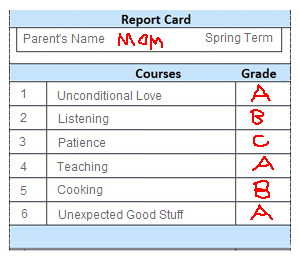It’s approaching the end of the school year, and as my son prepares for a variety of exams and final papers, I think about the report card.
Not his. Mine.
 As he continues his last push toward graduation, I find myself wondering what sort of marks I would receive as his parent. Of course, I wish I’d thought to do this two or three years ago, when I could have responded to feedback and adjusted accordingly.
As he continues his last push toward graduation, I find myself wondering what sort of marks I would receive as his parent. Of course, I wish I’d thought to do this two or three years ago, when I could have responded to feedback and adjusted accordingly.
Corporate Echoes
During my corporate career, performance reviews were a regular part of the ongoing work process. Not only were there planned annual evaluations – hierarchical, team, and peer processes – but informally touching base with co-workers and managers was the norm.
Who doesn’t need feedback – preferably in a constructive, ongoing fashion?
Performance reviews are a tried-and-true tool, so why wouldn’t they offer transferable value in parenting – or other aspects of our lives? Isn’t this exactly the concept behind the progress reports to parents in between report cards, so no one is surprised at the end of the semester? So you have a chance to prevent failure?
Relationship Realignment
And while we’re evaluating the applicability of, well… evaluating – why not introduce a similar concept into our relationships? Our marriages?
Some of us hold family meetings that involve children, but do couples periodically review their interactions? Their efforts and accomplishments when it comes to communication, to shared affection, to dividing up the household tasks, to simply having fun together? Oh – I’m not proposing a formalized meeting mind you, but then again, why not an occasional discussion of how things are going, and with specifics?
 Couldn’t report cards be helpful, if they highlighted areas for improvement and offered opportunities to celebrate when expectations have been exceeded? Or am I oversimplifying?
Couldn’t report cards be helpful, if they highlighted areas for improvement and offered opportunities to celebrate when expectations have been exceeded? Or am I oversimplifying?
Parenting, Single Parenting, Veto Power
As a single / solo parent, I’ve tried to listen, observe, and adjust my style over the years. When you’re carrying the ball alone, it’s easy to be so focused on forging ahead that you’re afraid to hesitate. To show weakness or to consider alternatives. But sometimes children will suggest them, directly or through their behaviors.
So what about it?
- Would you ask your kids to complete a report card for you?
- What subject matter would you include for grading purposes?
- Should we – as mothers and fathers – ask our kids devise a scoring system, and assess our performance?
Naturally, we would reserve the right to “weight” their judgments with our adult perspective, and to provide the starter-kit of topics for grading and discussion. But what if we also let them add their criteria? Wouldn’t this lead to revelations, possible paths for improvement, and likely a lot of laughter?
Assessing and Adjusting
Looking ahead to this weekend, and a Mother’s Day that will likely be very low-key, the best gift would be high marks from my sons on my parenting performance.
As for relationships, you never know who you haven’t met yet, or if you’ve met someone special who may eventually play a significant role. In that light, my romantic report card will wait, and I’ll see what the future may bring. As for that topical assessment, I imagine the subject matter would be a little different, and likewise, any celebration of a favorable outcome.
You May Also Enjoy
Happy Mother’s Day, BLW!!
If you find yourself in a book store searching for your Mother’s Day read, pickup a book about a mom we all owe a debt to called “The Immortal Life of Henrietta Lacks”, highly recommended.
After reading your post, I saw a post entitled “A Mother’s Day Report Card” (http://www.passiveaggressivenotes.com/2011/05/05/a-mothers-day-report-card/). Perhaps you wouldn’t like the report card, although it sounds like your sons are older than the little girl who created this one. Also, I worry that an actual report card would dilute the value and make moms competitive for the grade, rather than being the mom they want to be.
Interesting perspective, Ms. HalfEmpty. It wouldn’t have occurred to me to be competitive about the actual grade. I’d be much more interested in the areas my sons might note where I need to improve, not to mention the subjects they might add to my parenting duties that I would never think of.
As I consider this, perhaps the report card should be modified at different stages (just like subject matter in school). What an 8-year old might say (and of course, need) versus a 13-year old or a 16-year old are all quite different, just as the parenting challenges are. I’ll have to check out the post you mention. And thanks for joining the discussion!
Happy Mother’s Day, BLW! I am sure you are well “above average” in mothering grades.
Our eight year old grades us on a curve. He’ll say things like, “T. has his own iPad,” and “J. gets ten dollars a week for an allowance,” and “N. can watch all the TV he wants.” I think it translates to a D. Is there a make up class?
Seems to me, Wolf, that if your 8-year old does not have his own iPad, does not get $10/week, and can not watch all the TV he wants – you deserve an A.
BLW, the post I mention is completely in jest (a passive aggressive note). But I thought it was interesting that I saw it shortly after reading your post. So some kids do actually give their parents grades!
🙂
Happy Mother’s Day BLW! Hope you enjoying it.
Thanks, Rudri – you, too!
This reminded me of living in New York in the 80s when Ed Koch would run around asking, “How am I doing?” It also reminded me of my father-in-law who was an “easy grader” on movies, always finding something to like or appreciate. I was much more cynical back then, but as I age I find I’m becoming an easier grader myself, caring more about what people were going for, rather than if they achieved some ultimately subjective level of success. Still, I think asking our kids (and each other) for feedback is a great way to learn and grow—yet it’s the quality of the relationships that interest me more than the objectives of performance.